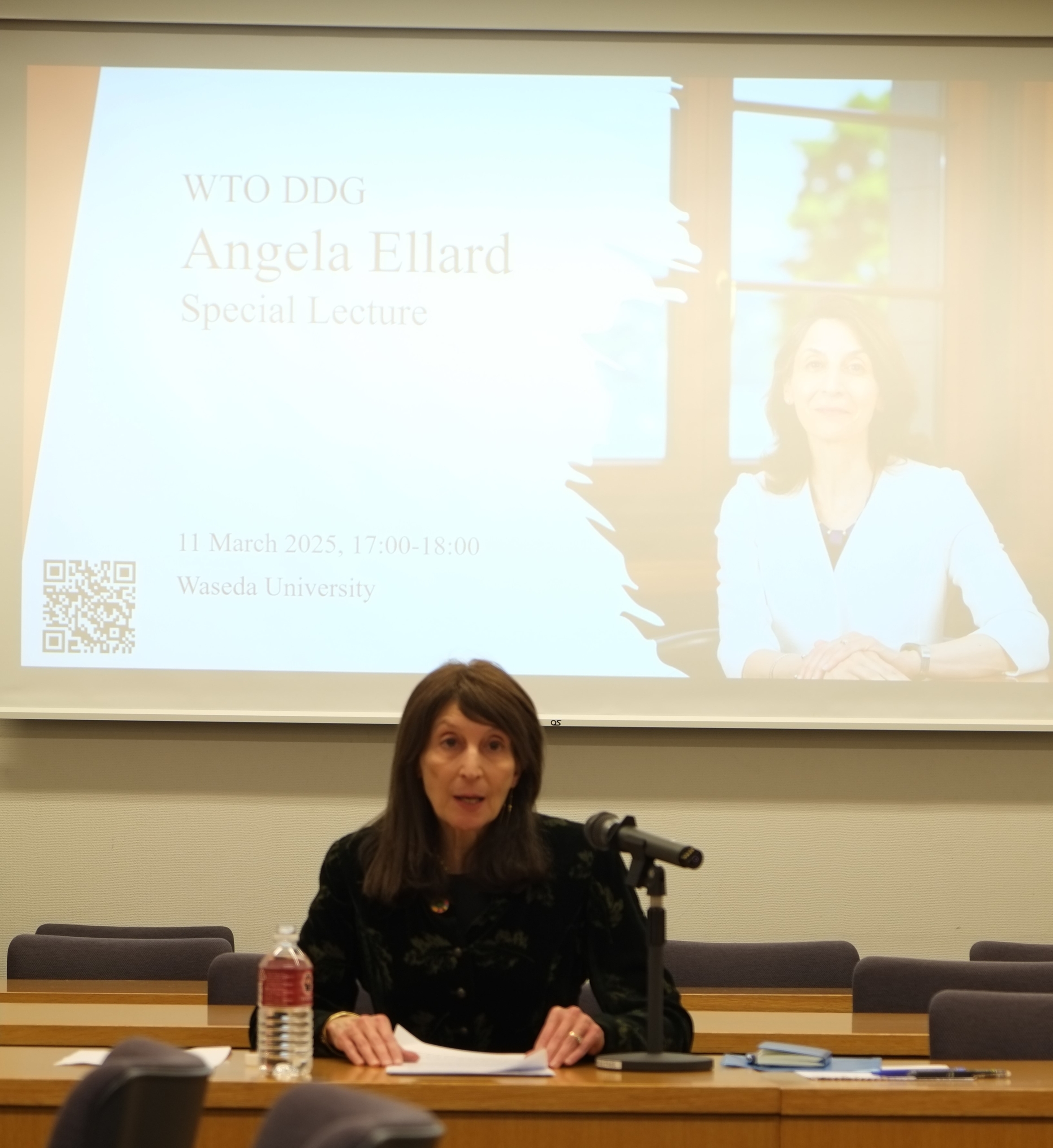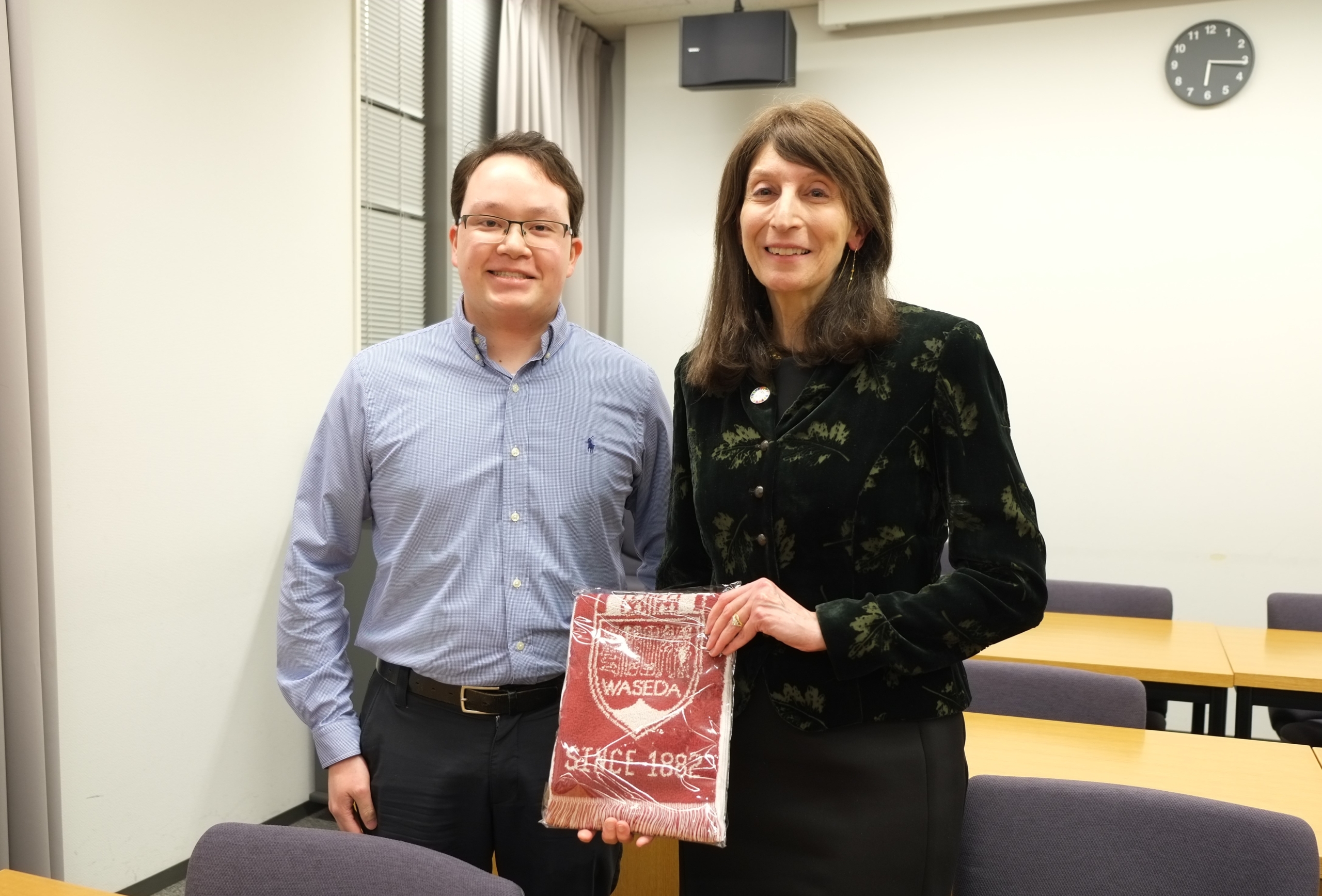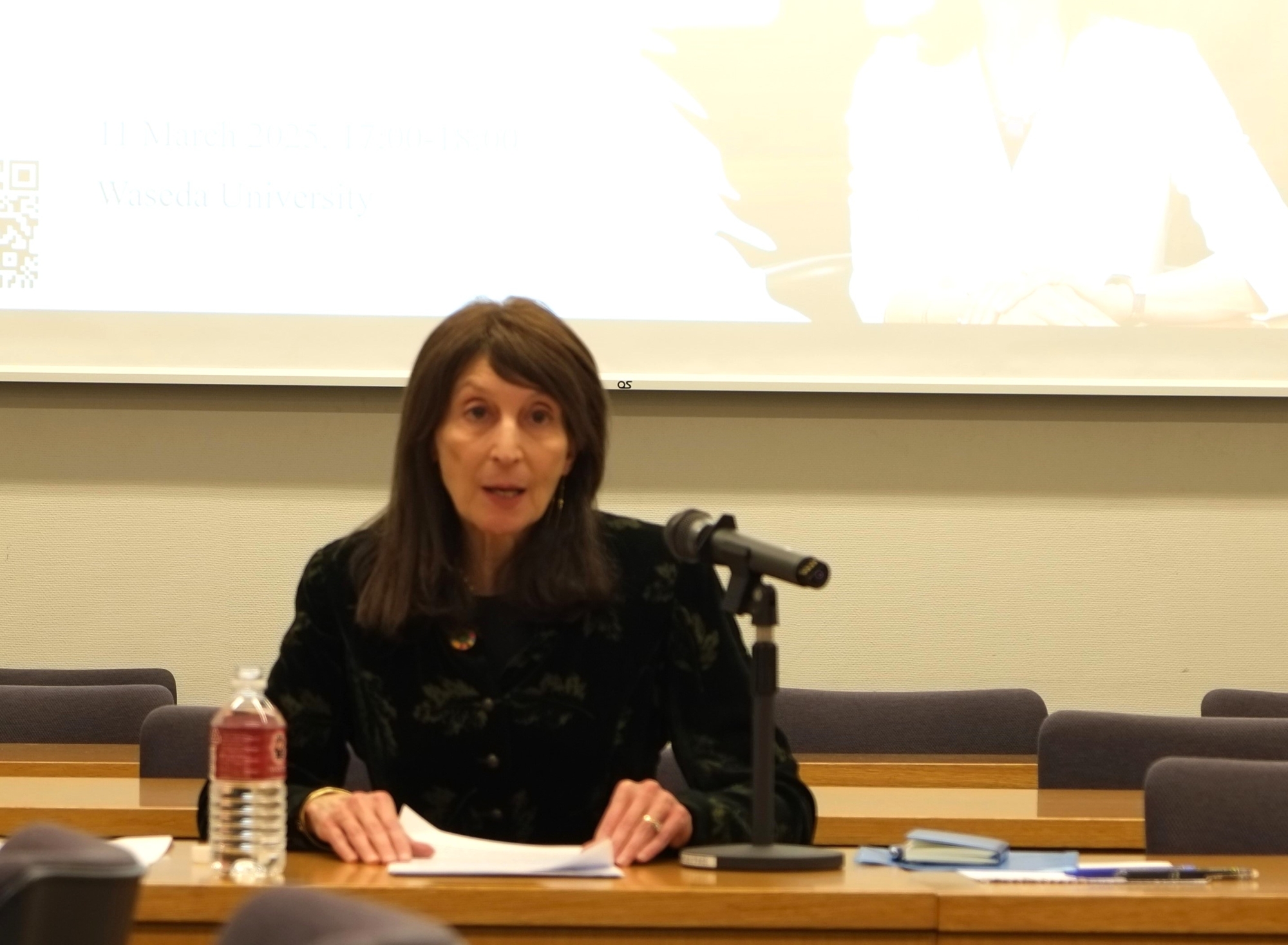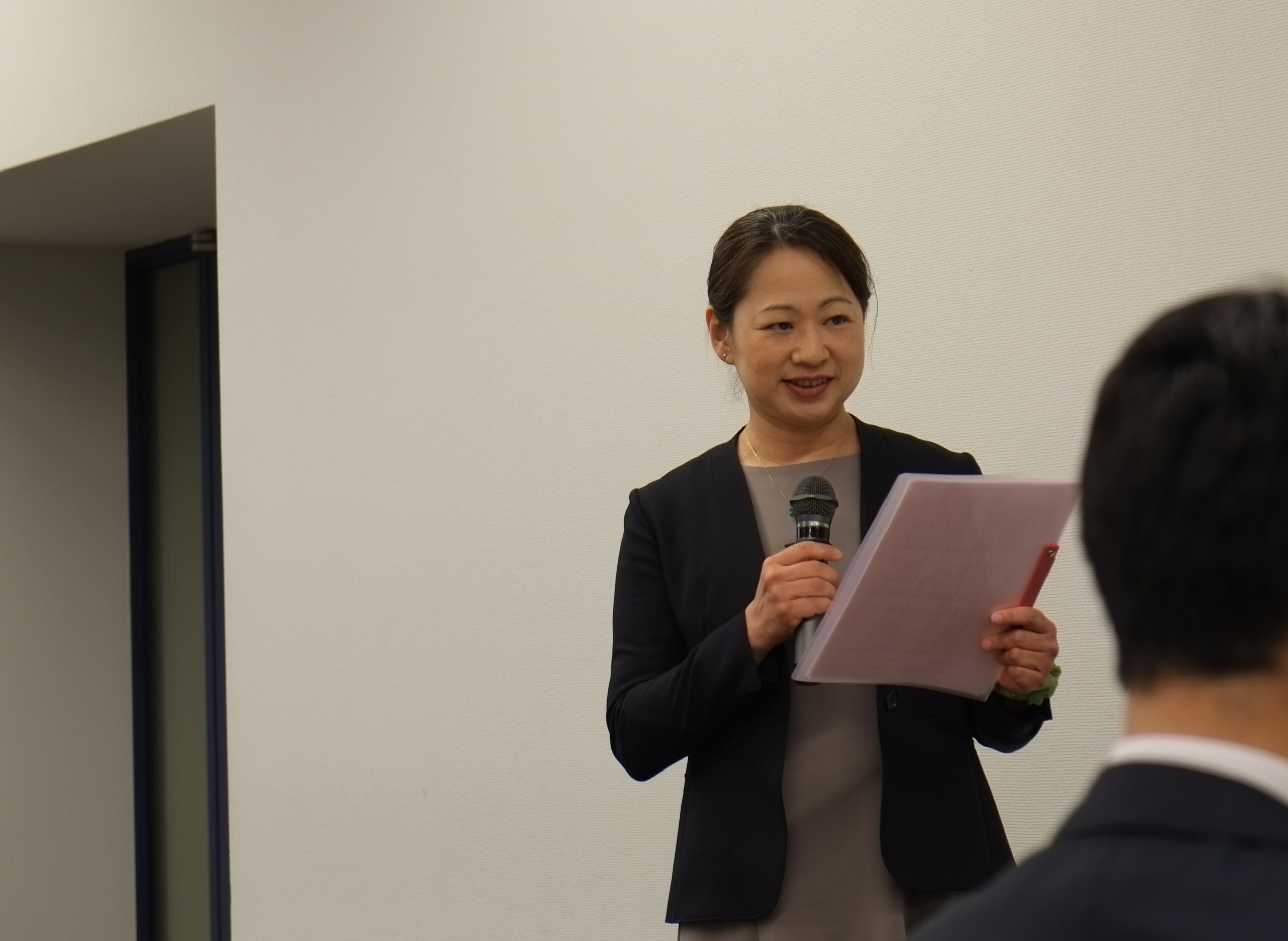WTO Deputy Director-General Angela Ellard Addresses the Future of Global Trade and Multilateral Relations
Thu, Apr 17, 2025-
Tags
This article reflects the student’s understanding of the speech of the WTO Deputy Director-General Angela Ellard. The full text of the speech is available here.
On Tuesday, March 11, Waseda University had the privilege of hosting the World Trade Organization (WTO) Deputy Director-General (DDG) Angela Ellard for a special lecture attended by students, faculty, and staff. DDG Ellard highlighted some of the major issues that the WTO currently faces, including ending harmful fisheries subsidies, reforming the dispute settlement mechanism, addressing developmental challenges, advancing multilateral work on e-commerce, and seizing the opportunities created through plurilateral initiatives. Amid a shifting world order marked by challenges and uncertainty, DDG Ellard encouraged Waseda’s future leaders to play a role in preparing and strengthening global institutions for an unpredictable future.

World Trade Organization Deputy Director-General Angela Ellard
This year marks the 30th Anniversary of the WTO – a milestone that comes at a time when the Organization faces significant challenges to its resilience and continued relevance. Among these are the growing difficulties in reaching consensus among its diverse members and the rise of protectionism by some of the world’s strongest economies. Despite these headwinds, DDG Ellard emphasized the enduring value of the WTO and highlighted its recent achievements.
One pressing global issue where the WTO has made meaningful progress is in addressing harmful fisheries subsidies. As nations develop the waters around their borders, the rise of fishery exploitation and illegal fishing has wreaked havoc upon the natural ecosystems and existing sustainable fisheries around the world. Curbing the 22-billion-dollar harmful fisheries subsidies that exist around the world is a top priority and has been a major issue that the WTO has been working on with its members. As a result, in 2022, the WTO Agreement on Fisheries Subsidies was successfully concluded by consensus. DDG Ellard stressed the importance of the successful passing of this agreement as it will not only greatly contribute to worldwide sustainability but also achieve UN Sustainable Development Goal 14.6 by prohibiting subsidies to illegal fishing, fishing of overfished stocks, and fishing in the unregulated high seas. As the first WTO agreement with sustainability at its core, this would be a historic moment if it is fully ratified and takes effect. The Agreement needs to be accepted just by 15 more Members to become operational, which is expected to occur by June of 2025.
The second reform priority is reforming the WTO dispute settlement system. Although the WTO has a two-tier dispute settlement system, consisting of panels and the Appellate Body, the second tier is currently non-functional. As of December 2019, the Appellate Body has been unable to function due to a lack of consensus on the appointment of new Appellate Body members. Some WTO Members have expressed the view that the Appellate Body has overreached its mandate and expanded Members’ substantive obligations.
This situation undermines the system’s finality as any panel decision can be appealed to a non-functioning Appellate Body – referred to as “appeals into the void”. DDG Ellard outlines Members’ efforts and progress made to reform the dispute settlement system and stressed that the dispute settlement function remains central to the functioning of the WTO and the success of the multilateral trading system. She observed that despite the challenges “the work of dispute settlement remains robust at the WTO”, with WTO Members initiating new disputes and exploring alternative avenues for appellate review, such as arbitrations.
Finally, as technology continues to develop and the digital divide persists, DDG Ellard underlined the need to bridge this gap and foster trust among members, ensuring that no one is left behind. She noted that the extension of the moratorium on the imposition of customs duties on electronic transmissions across borders, which has been in place since 1998 and extended multiple times, has sparked ongoing debate. While developed and many developing WTO Members advocate for its extension or even making it permanent, some developing members have expressed concerns about its impact on their ability to collect revenue. As another deadline approaches, DDG Ellard highlighted Japan’s long-standing support for the moratorium and urged that dialogue on its extension continues.
DDG Ellard also discussed two important plurilateral agreements: the Investment Facilitation for Development (IFD) Agreement and the Agreement on Electronic Commerce. Japan has played a leading role as a co-convenor of the latter. While WTO Members have finalized the texts of these agreements, consensus on incorporating them into the WTO rulebook has not been reached due to objections from several Members.
In summary, the key message of the lecture was that the unpredictable nature of the current geopolitical landscape underscores the urgent need to reinforce the global multilateral trading system. DDG Ellard noted that some countries’ skepticism towards the global economic integration has created an environment of uncertainty, which is already impacting businesses worldwide. DDG Ellard reminded the audience that the WTO governs approximately 80% of global trade, and that a collapse into two trading blocs could result in a significant loss of global GDP. This warning comes at a pivotal moment, as the world faces a choice between a unified global trade system and one that is increasingly fragmented.
She emphasized the importance of measured decision-making, urging governments to remain calm and thoughtful in the face of protectionism, including tariffs. Responses to these challenges, she cautioned, must not be hasty or counterproductive. Finally, DDG Ellard concluded with a Japanese adage: ‘Adversity is the seed of growth.’
While the future of the global trade order remains uncertain, she remained optimistic that the WTO, through reform and revitalization, will remain a cornerstone in shaping the future of global trade.
After the lecture, attendees were encouraged to ask questions, some of which centered around the dispute settlement mechanisms within the WTO. DDG Ellard addressed the dispute settlement issues by highlighting that the basis of all settlement is trust. She recognized that the legitimacy of the adjudication and a venue for an interspace negotiating framework is essential to arbitration, and that having an appeal process is vital to the very existence of the WTO. In addition to these questions, I was able to briefly ask the DDG a question in regard to urban development. What this meant to me as an urban planning professional was significant as the resilience of supply chains and stability of global trade is paramount to the continuation of global development as a whole. As a Waseda student, it provided a deep insight into the current function and potential future of global trade as this is the world we will inherit. As the lecture wrapped up, an additional participant sought clarification on the WTO’s role in a global trade order based on pure self-interest, as opposed to “enlightened self-interest.” In conclusion, DDG Ellard expressed her own assessment of the future of the WTO, that reform is vital for the continuation and existence of the organization. In the end, the Deputy Director-General challenged students at Waseda to be adaptable in uncertain times and to help build a reformed organization to support re-globalization and ensure a stable, prosperous global trade system.

The author with DDG Ellard
This article was written by the following Student Contributor:
Connor Mangelson
Graduate School of Creative Science and Engineering















